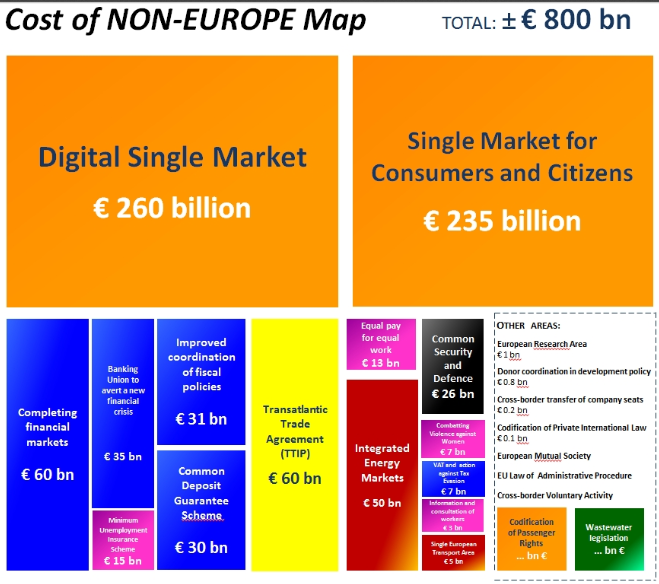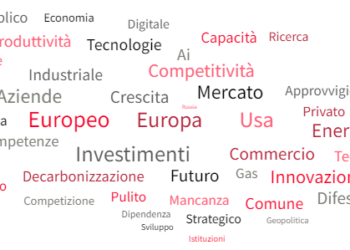An ‘uncompleted’ Union costs at least 800 billion euro a year. Practically, 6 percent of the GDP is missing in Europe because of the delays in the realisation of a true communitarian project. These are the estimates listed in “Mapping the Cost of Non-Europe, 2014 – 2019,” a study from the European Parliamentary Research Service realised as a contribute for the next EP term. The document “is intended as a contribution to the growing discussion about the European Union’s policy priorities for the coming five-year institutional cycle,” as explained in the introduction.
The study highlights the critical points in which the outgoing Parliament, during its term, has already called for improved efforts by both the Commission and the Council in order to strengthen the European economy. A first area of intervention is the digital single market. Here, completing the market could raise the long-run level of the EU GDP to around 520 billion euro at current prices (by 4 percent) even though “the regulatory complexity of de-compartmentalising the existing markets in this field suggests that such a potential may take a sustained period of time to realise.” In the short-run, the Parliamentary Research Service makes the plausible assumption that, with the right policies in place, around half that gain to the European economy (about 260 billion euro a year) could be achieved. Unfortunately, “the current situation in the digital field is still largely one of the fragmentation of an incomplete single market into essentially 28 national markets.”
Non-Europe has a significant impact on the unrealized single market for consumers and citizens: “A cautious analysis of the potential for continued efficiency gains in the European economy suggests lower-bound gains in the region of 1.8 per cent of long-term EU GDP (some 235 billion euro per year), compared with the status quo,” reads the study. In order to do so, there should be “better transposition, implementation and enforcement of existing single-market legislation” as well as improved market surveillance of the product market. Efficiency gains of some 50 billion euro could be made with a more economically and physically integrated single market in energy: “a full implementation of the third energy package” is one of the main things on which the outgoing Parliament has insisted during its term.
The EU economy should be boosted by a “fully implemented” TTIP, the Transatlantic Trade and Investment Partnership, by 0.5 per cent of GDP, or 120 billion euro annually, according to a 2013 European Commission forecast. The Parliament preferred a more cautious approach and suggested that potential benefits from the TTIP is 60 billion euro per year. MEPs called for an agreement capable of creating employment – more than mere figures. One of the most problematic issues has always been common security and defence policies: their potential efficiency gain amounts to about 26 billion euro a year, with a cautious estimate. There are in fact studies suggesting that a closer cooperation at European level could even mean 130 billion euro a year. “With 10 per cent industrial efficiency gains, due to greater cooperation, the figure comes in at least 26 billion euro per year (at 2011 prices),” reads the report. Additional 31 billion euro could be gained with improved coordination on fiscal policies. Moreover, a 10 percent reduction of the violence against women could mean a potential efficiency gain of 7 billion euro yearly. Violence against women bears a cost in terms of services (health services, legal system, specialised services) and lost economic output (diminished productivity, loss of concentration at work) and, of course, in terms of pain and suffering of the victims (costs borne by victims).
The European Union has its own little treasure to conquer. A message targeted also to those who do not believe in the European project. Eurosceptics in Brussels and Strasbourg have a 52-page document at their disposal on which they could meditate on. The potential growth and competitiveness of Europe needs to be boosted, and this could be allowed even through their choices.











